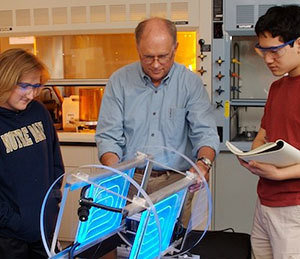 At work on a QuarkNet experiment.
At work on a QuarkNet experiment.
The University of Notre Dame has received a five-year, $6.1 million award from the National Science Foundation to support the continuation of the nationwide QuarkNet program, which uses particle physics experiments to inspire students and provide valuable research, training and mentorship opportunities for high school teachers.
Through the QuarkNet program, physicists at Notre Dame, Fermilab and 50 other research institutions will continue to mentor teachers in research experiences, enabling them to teach the basic concepts of introductory physics in a context that high school students find exciting. Faculty, students and teachers work together as a community of researchers, which not only develops scientific literacy in students, but also attracts young students to careers in science and technology.
“The Notre Dame QuarkNet Center is a great example of the mentoring and training provided by particle physicists at universities and national laboratories across the country," said Mitchell Wayne, professor of physics and principal investigator of the NSF grant. "It has become a focal point for educational outreach into our community. Hundreds of local high school students and many of their teachers have done research in particle physics at the center.”
In addition, other education and outreach programs have been initiated by QuarkNet teachers, most significantly the Notre Dame extended Research Community (NDeRC), a significant GK-12 effort that brought interactive projects in physics, chemistry, biology and engineering to thousands of local schoolchildren.
One key feature of QuarkNet is the summer research experiences that participating centers offer for teachers and students. During its first year, each QuarkNet Center provides two teachers with eight-week research appointments and develops their expertise as lead teachers. In following years, each center may choose to host a team of high school students and a teacher for a research experience. Recently, 15 teachers, 14 students, nine mentors and a graduate student worked on nine different projects with Notre Dame faculty, including investigations into new scintillators, a presentation of particle physics in the Notre Dame Digital Visual Theater, investigations using the Compact Muon Solenoid e-Lab, and cosmic ray studies.
In the past few years, the reach of QuarkNet has become international, with QuarkNet-sponsored activities such as cosmic ray studies and master classes now being offered to students and teachers around the world. Since 2006, more than 2,100 students have participated in master classes. Currently, students in 25 countries are participating. Held at university and laboratory centers, master classes are institutes for teams of students who become physicists for a day, analyze real experimental data and discuss results through video conferences with physicists and peers across the world. “They are looking at particle events, making determinations, doing counting themselves, coming to their own conclusions,” said Notre Dame’s Kenneth Cecire, who facilitates master classes in the United States.
Notre Dame was one of the initial QuarkNet Centers. Randy Ruchti, a professor of physics at Notre Dame, started the center 15 years ago when the Large Hadron Collider (LHC) was still a decade away from operation. His vision was to inspire and educate high school students who would be interested and engaged in particle physics, and who would be prepared to work on the LHC project. To reach these students meant reaching out to their teachers and engaging these skilled professionals in the research effort. “The program has worked amazingly well, and is a two-way process: for teachers and students — professional development and forefront research experiences; for physicists — critical educational input from master teachers and expansion of the research effort to nontraditional, enthusiastic participants," Ruchti said.
Students and teachers in the QuarkNet program helped to build elements of the major Fermilab and LHC experiments over the last decade and are working on new detector upgrades. They are able to look at the latest scientific data from the LHC experiments, including events from the search for a Higgs-like boson, whose discovery was recently announced at CERN, the Center for European Particle Physics, on July 4. Ruchti says, “It just doesn’t get more scientifically exciting than this!”
“We are delighted to receive this new award, and we are really looking forward to the next five years of QuarkNet,” Wayne said. During the next five years, the Notre Dame QuarkNet faculty will continue all of their present activities and begin some new initiatives, including outreach to the Native American community.
The QuarkNet program involves more than 500 high school teachers across the United States. Funding for the program also comes from the U.S. Department of Energy, administered by Fermi National Accelerator Laboratory.
Contact: Mitchell Wayne, 574-631-8475, mwayne@nd.edu